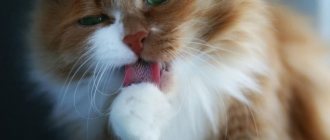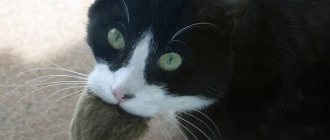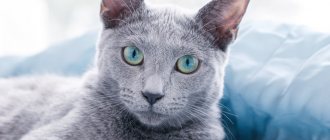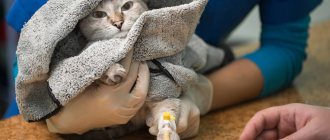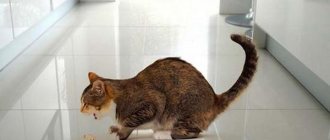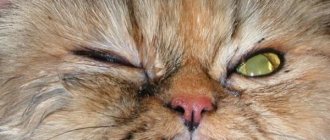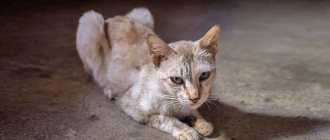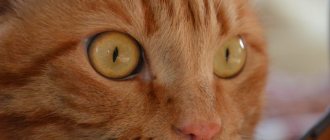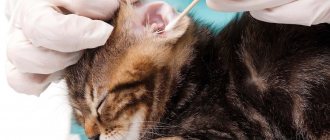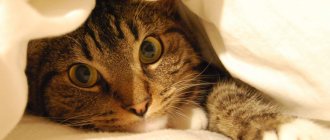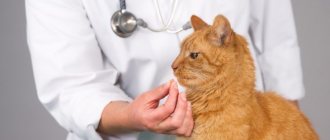If a cat grinds its teeth or clicks its jaw, this may be a symptom of traumatic injuries, infectious diseases or inflammatory processes, or helminthic infestations. Clicking is accompanied by loss of appetite, cramps, and inflammation of the gums. To identify the etiology of the squeaking, the owner must take the cat to a veterinarian, who will conduct a diagnosis and prescribe medication or surgery.
According to veterinarians, one of the reasons that causes a cat to grind his teeth in his sleep is the chronic stressful state in which the animal is.
Possible reasons.
- Repressive behavior.
Sometimes cats start smacking when they feel anxious. For example, when a cat is brought to the clinic and placed on the veterinary table, it cannot decide what to do - show aggression or, conversely, run away. To relieve stress, some cats resort to repressive behavior, such as grooming their fur or licking their lips. - Obsessive-compulsive disorders.
Cats with these disorders also sometimes lick their lips, although most lick their fur more often. - Nausea.
Cats that are nauseous or dehydrated may lick or slap their lips excessively. This is often accompanied by drooling and smacking. - Dental diseases.
With dental disease or oral infections, the cat may also lick or smack its lips intensively. As dental disease progresses, plaque turns into tartar. The buildup of tartar above and below the gum line gradually creates an environment for bacteria, which gradually leads to the destruction of periodontal tissues. Due to dental disease, cats may eat poorly, lose weight, and may drool profusely. - Oral ulcers.
Oral ulcers can be painful, cause tissue to swell, cause your cat to lick its lips, and cause drooling. Ulcers can form due to oral infections, dental disease, systemic diseases (such as kidney disease), or the ingestion of caustic substances (such as detergents). - Something tastes strange.
Cats begin to slap their lips if any substances, food, garbage, etc., the taste of which is unfamiliar to the cat and causes bewilderment, gets on the tongue. - Wounds.
The resulting injuries can also cause the cat to lick itself, although more often the cat licks the affected area, sometimes until bald patches form. - Unconscious licking of lips.
Some cats may suffer from bouts of illness that involve chewing movements, biting the air, or uncontrollably licking their lips. Most often these are focal attacks.
- Foreign bodies in the mouth.
Very often, the cause of smacking is foreign bodies that have entered the mouth. These are usually small objects, such as pieces of bone or wood chips. Another common cause is tough plant parts. - Bites.
Bites received from other cats or insects (spiders, flies, bees) can lead to the cat actively licking its lips. Snake bites on the face and mouth also cause pain and cause inflammation, discharge and licking of the lips.
What to do if a cat spanks with its lips.
If you notice that your cat has started smacking its lips, the first step is to determine whether it is caused by a medical problem. To understand this, you need to do the following:
- Assess the cat's behavior.
Is she nervous? Perhaps worried or scared? Try to determine if the cat is trying to communicate anxiety by slapping its lips. If you think that the situation may cause discomfort in the cat, this may be a manifestation of repressive behavior. You can help your cat by eliminating the cause of stress and improving the environment. - It is important to understand whether lip smacking is caused by a medical problem.
It is best to contact a veterinarian. Try to track when the cat spanks with its lips. Does she do this all the time or, for example, after eating? Or in moments of anxiety or worry? This information will help your veterinarian figure out the cause. Doctors also check the condition of the skin on the face and lips, gums, teeth and oral cavity. They look to see if there are any foreign objects in the mouth, if the cat is suffering from dental diseases, or if there are ulcers in the mouth. The doctor may need information about the cat's diet, changes in its usual diet, possible poisoning, appetite, vomiting, diarrhea, activity and weight loss.
The title is funny but... Some time ago, the cat’s breath began to stink horribly, and he was constantly slurping and smacking disgustingly, as if he were collecting drool. Plus, to all this, his eyes became constantly dirty, brown discharge, almost red. At the veterinary clinic, a PCR test found herpes, but he has no ulcers, he does not sneeze or cough. I think the analysis is wrong. Whose cats had the same thing, what was the diagnosis for your pets?
These are two different diseases: conjunctivitis and neurosis.
The cat had something similar. But he was 17 years old. It turned out to be cancer. The smell was completely strange. Unfortunately, I had to put him down. I hope yours isn't that serious. But if the cat is old, then... Follow all doctor's recommendations, if the doctor is good.
when there is nausea, ultrasound and biochemistry. check your stomach
discharge from the eyes is most often conjunctivitis or allergy! most likely you are feeding some kind of shit
Go to another veterinarian. what do you feed? a lot depends on food
What do you feed, what do you feed. Catches and eats mice and rats.
could be cancer. This happened to my cat. liver cancer
